 Today is my first day back in the office after a road trip from Vancouver to Los Angeles, taking in many exciting cities, national parks, activities, etc en route. From spotting killer whales in the San Juan Islands to making the most of tax free shopping in Portland to hydrobiking in Long Beach harbour, I’ve packed in lots of fun! One of the coolest things we did, however, was to go to the La Brea Tar Pits at the Page Museum in Los Angeles.
Today is my first day back in the office after a road trip from Vancouver to Los Angeles, taking in many exciting cities, national parks, activities, etc en route. From spotting killer whales in the San Juan Islands to making the most of tax free shopping in Portland to hydrobiking in Long Beach harbour, I’ve packed in lots of fun! One of the coolest things we did, however, was to go to the La Brea Tar Pits at the Page Museum in Los Angeles.
 The La Brea Tar Pits is one of the world’s most famous fossil localities, recognized for having the largest and most diverse assemblage of extinct Ice Age plants and animals in the world. Whilst I was walking around the museum looking at skeletons of giant sloths and sabretooth tigers, a fossilised mammoth tooth (the size of my head) and a display of 404 dire wolf skulls, I had a eureka! moment. The museum is an excellence example of transparent research that engages the public and results in huge societal impact.
The La Brea Tar Pits is one of the world’s most famous fossil localities, recognized for having the largest and most diverse assemblage of extinct Ice Age plants and animals in the world. Whilst I was walking around the museum looking at skeletons of giant sloths and sabretooth tigers, a fossilised mammoth tooth (the size of my head) and a display of 404 dire wolf skulls, I had a eureka! moment. The museum is an excellence example of transparent research that engages the public and results in huge societal impact.
The entire research lifecycle is onsite and visible to visitors, including information on:
- how the research is funded and why it is important to society
- how different disciplines are working collaboratively
- the tools and techniques used
- how the research is changing our understanding of evolution and science
- how different community groups are engaging with the research
- examples of research outputs produced
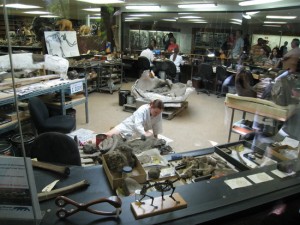
Through windows at the Page Museum Laboratory, visitors can watch bones being cleaned and repaired. Visitors can also visit Pit 91 and see a tar pit being excavated.
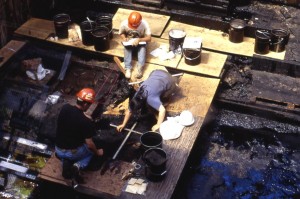
The Museum periodically canvasses visitor opinions and surveys changes in public understanding to ensure that research impact is being maximised and to justify the public funding that makes the research possible.
Evidently this integration of engagement, access to research and demonstrable societal impact is easier in some disciplines than others but research shouldn’t be taking place behind closed doors in universities; members of the public should be involved throughout the research lifecycle. This is a key strategy of Research Councils UK (RCUK) and other major funding bodies (such as Defra and the Royal Society). You can access the Concordat on Engaging the Public with Research here.








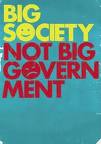 Members of the Arts and Humanities Research Council’s Peer Review College have resigned over the council’s continued refusal to remove references to the government’s Big Society slogan from its delivery plan.
Members of the Arts and Humanities Research Council’s Peer Review College have resigned over the council’s continued refusal to remove references to the government’s Big Society slogan from its delivery plan.
 Following on from the recent AHRC/Radio 3 New Generation Thinkers pilot scheme and the over-subscribed AHRC Broadcast Media workshops , the
Following on from the recent AHRC/Radio 3 New Generation Thinkers pilot scheme and the over-subscribed AHRC Broadcast Media workshops , the 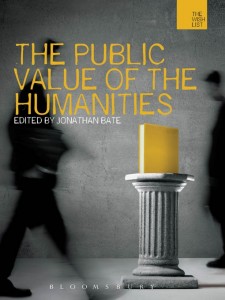 Demonstrating the public value of research will be a significant part of the forthcoming REF exercise. Most major funding bodies now require an impact statement as part of the application process. Universities are being required to demonstrate that their research offers value for money and tangible benefits outside of the academic sphere. This is easier in some disciplines than others, with many people believing the arts, humanities and social sciences (AHSS) will struggle to demonstrate impact.
Demonstrating the public value of research will be a significant part of the forthcoming REF exercise. Most major funding bodies now require an impact statement as part of the application process. Universities are being required to demonstrate that their research offers value for money and tangible benefits outside of the academic sphere. This is easier in some disciplines than others, with many people believing the arts, humanities and social sciences (AHSS) will struggle to demonstrate impact.

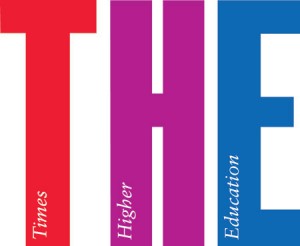











 New weight change BU paper
New weight change BU paper One week to go! | The 16th Annual Postgraduate Research Conference
One week to go! | The 16th Annual Postgraduate Research Conference Geography and Environmental Studies academics – would you like to get more involved in preparing our next REF submission?
Geography and Environmental Studies academics – would you like to get more involved in preparing our next REF submission? Congratulations to three former BU staff
Congratulations to three former BU staff MSCA Staff Exchanges 2024 Call – internal deadline
MSCA Staff Exchanges 2024 Call – internal deadline Applications are now open for 2025 ESRC Postdoctoral Fellowships!
Applications are now open for 2025 ESRC Postdoctoral Fellowships! Horizon Europe – ERC CoG and MSCA SE webinars
Horizon Europe – ERC CoG and MSCA SE webinars MaGMap: Mass Grave Mapping
MaGMap: Mass Grave Mapping ERC grants – series of webinars
ERC grants – series of webinars